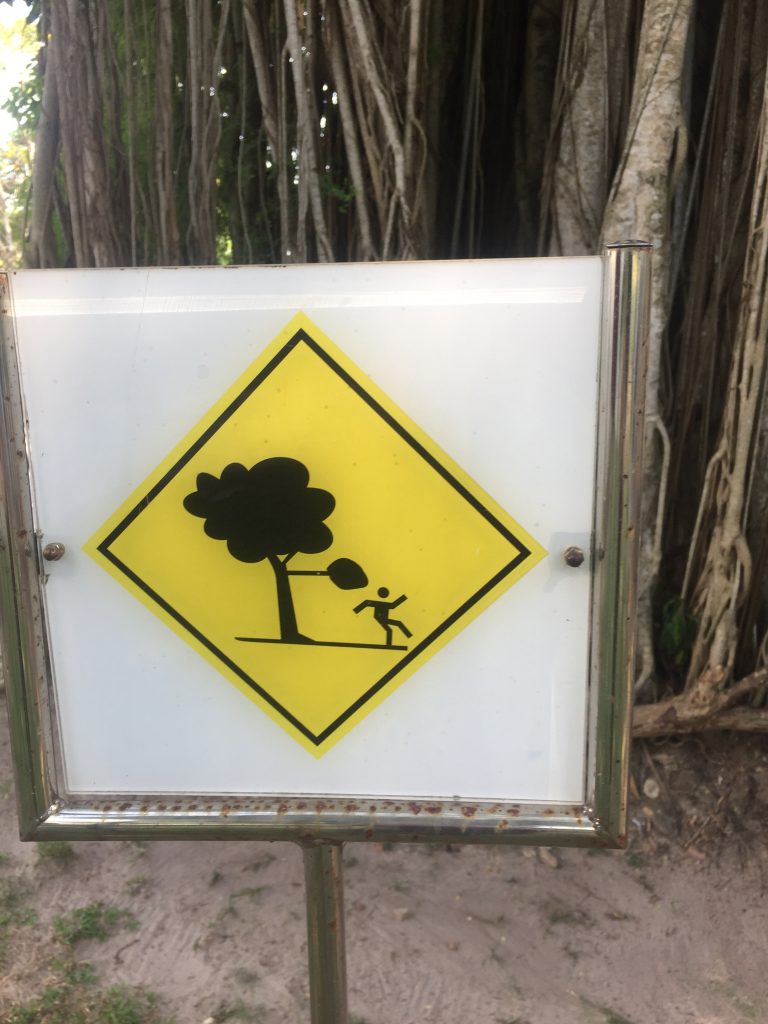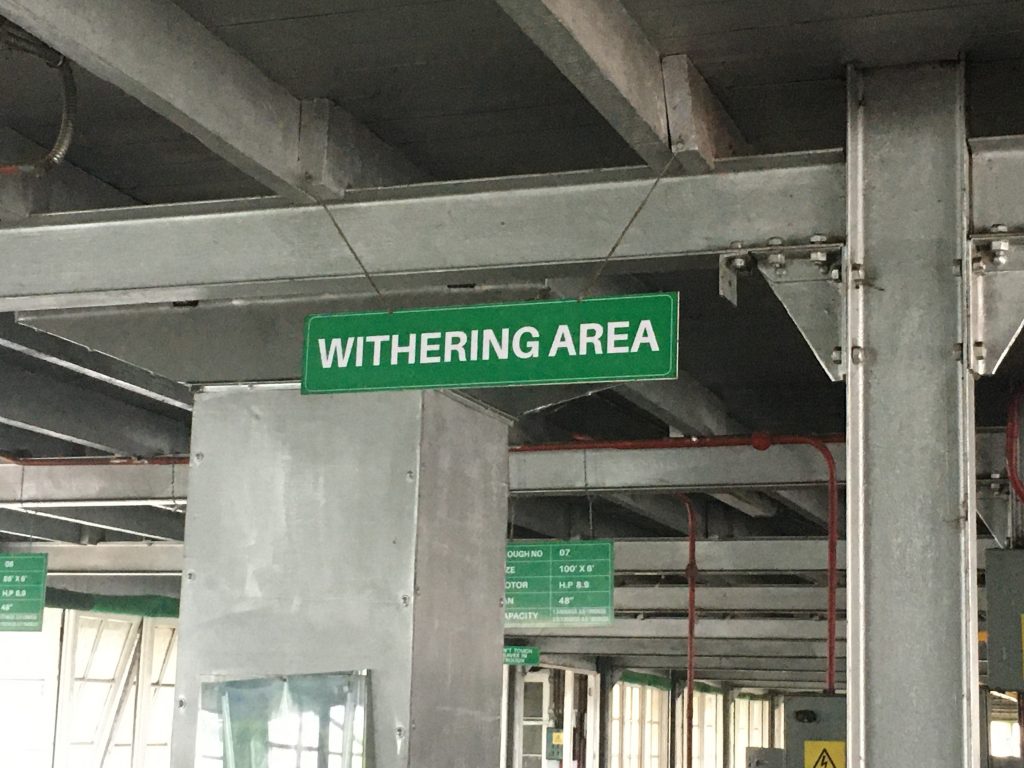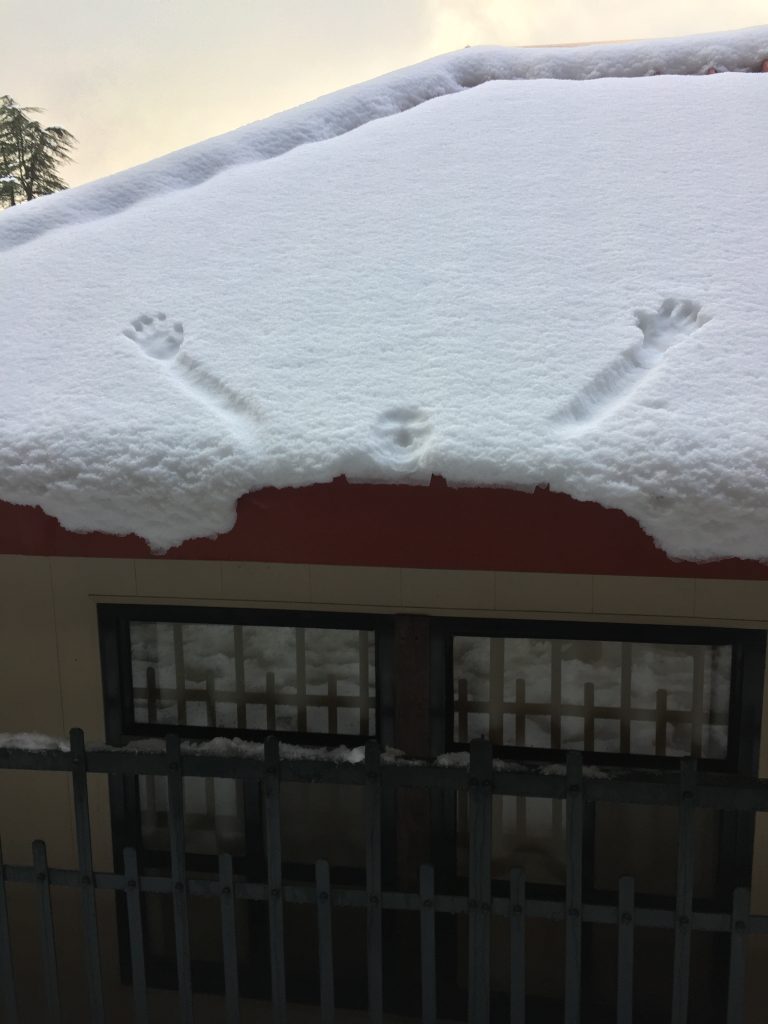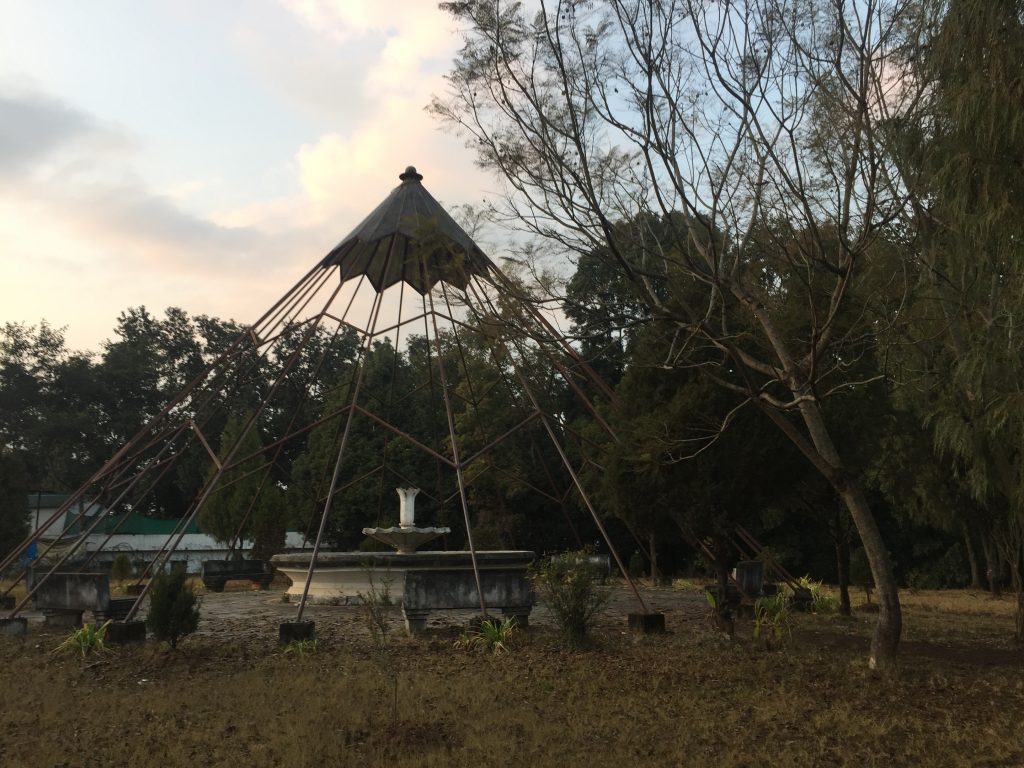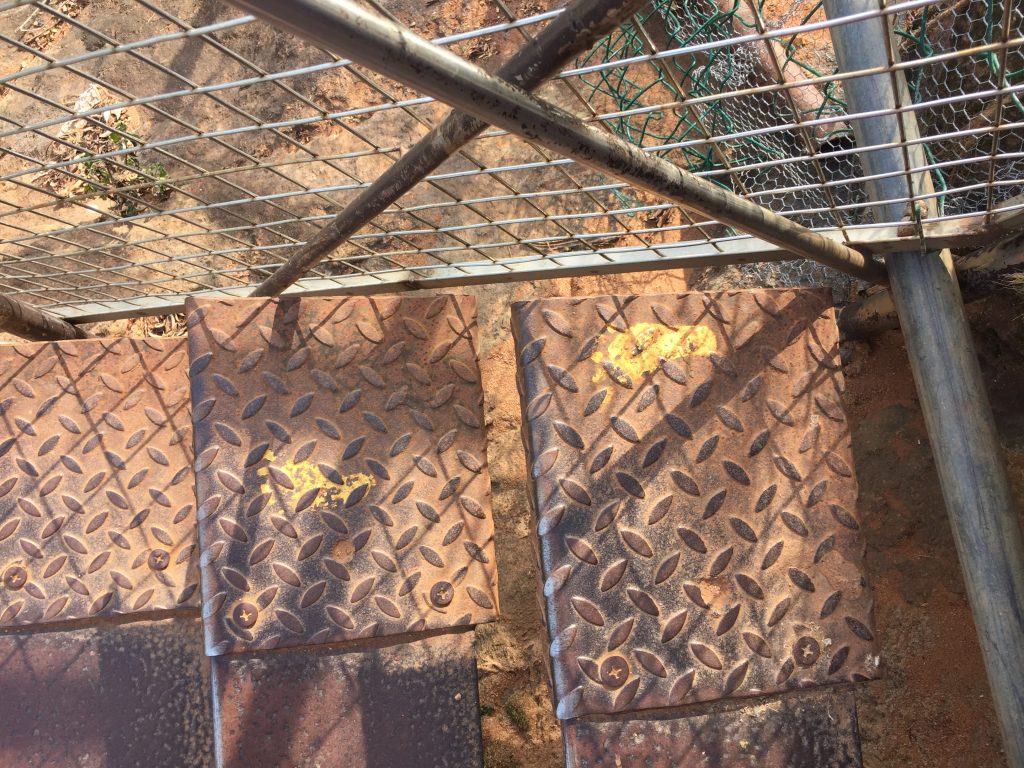
‘There is a public “discovery” of the ‘Graycard’ phenomenon every few years, they being featured middle-way through a ‘Top 10 Games You Never Knew Existed” list or a regional tournament being live-streamed via the hidden camera of some exhibitionist onlooker. Despite these minor publicity spikes and despite the wide, if shallow, public knowledge of their existence, actual acknowledgment of ‘Graycards’ outside of the Wayside is perpetually tenuous. Most people will have seen the booster packs in gas stations before and some of those people, likely those who have pushed them aside for other collectible cards, will be able to describe the game’s motif without realizing.
For example, they will never remember ‘Graycards’ as having their own hook on a display or box on a shelf. They will have noticed them accidentally mixed in with other cards or, more often, in loose piles behind the cases of other games. They will remember the packs as looking aged and crumpled, dusty and potentially stained by whatever may have leaked in the truck that stocks the station. They may remember the lack of art and the poor title layout, as though ‘Graycards’ only exist as a bootleg of themselves. Most who have owned ‘Graycards’ have been gifted them by grandparents who don’t understand the differences between games and are happy to save a dollar. They are sometimes handed over wordlessly with a receipt for unrelated products as part of some un-advertised special.
Inexplicably, ‘Graycards’ exist in the peripheries by design. The tarnished foil of their booster packs is printed on, as is the dust and staining. Packaging becomes duller year by year. The brand that supposedly prints the cards changes with each set and a little research reveals none of the companies have ever existed. The less-than-ideal shelf placement stems from the perpetual low stock and low turnover. The placement and the packaging feed into each other and the cycle maintains the product’s relative camouflage among items that are designed to draw attention.
The cards themselves are well-made and rarely as damaged as they seem from the outside. Styles vary set by set with a few clear patterns. Each set is characterized by a single color in addition to grayscale illustrations. Each set contains sporadic cards on which the lettering is printed in silver ink (seemingly the ‘foil’ of ‘Graycards’). Every known card has the same back- a series of nested circles in black and white. This pattern is mirrored by a small holographic circle on the corner of the face-side, acting as a mark of authenticity and making it difficult to scan or even take quality pictures of the cards.
‘Graycards’ seem only to emerge in booster packs and, as such, there is no official source for rules. Several popular variations of play exist and can be found online, their sources inevitably the writings and experiences of those who played before the internet allowed for such collaboration. Though the bulk of rules are agreed upon, regional variations represent another obstacle in the popularity of the game. A winning deck in the northwest will be entirely incompatible with a tournament in the south.
New ‘Graycard’ set releases are sporadic and frustrating enough that most believe it is another means by which the creators of the game sow discord among the playerbase. Booster packs for historical sets (say, the Ultraviolet Crimson set, widely available in 1994) will reappear in bulk decades after their initial printing. Promotional singles have been known to fall out of chip bags, condom boxes, and cases of car oil. It’s rare that a tournament occurs without the debut of an otherwise unknown card that defuncts prize-winning decks and overturns the meta understanding of the game, usually prompting accusations of cheating and forgery. Backhandedness is encouraged by a number on each card that seems to indicate how many of its kind have been printed. The collection or destruction of specific cards in order to boost power and rarity is common. At least one card, ‘The Eavesdroplet’ from 1988’s Pale Beige set, is thought to have been made extinct by these practices.
The inclusion of ‘Graycards’ in tournaments and conventions are relatively common, though the events are rarely a headline attraction and are commonly relegated to the conference rooms of nearby hotels. Perpetual travelers that add a pack of ‘Graycards’ to their gas-station lunches now and again can easily turn a profit at such a get-together, the serious playerbase being one that does not get out all that much. In fact, this pseudo-pollination seems to be the only mechanism in place to keep ‘Graycards’ afloat, it being a game that resists playing.’
You might imagine the cool stab of fear I experience upon opening the Stranger’s copy of ‘Autumn by the Wayside’ and seeing a black and white card flutter to the ground, seemingly a forgotten keepsake made bookmark. It bears an uncanny resemblance to a card I carry in my own copy- the Traitor from my days of playing with Sebastian’s group. The one is clearly inspired by the other, Sebastian himself having created the game while working at a gas-station. The phantom pains of my burn-scarred arm ease as I mark the differences and assure myself that his was a curse dispelled.
I’ve seen the packs of ‘Graycards’ now and again. They’re difficult to miss if you spend enough time on the road. I even followed the advice in Shitholes once, buying them up until I had a little shoebox of boosters to sell out of the back of the truck at a college campus. The buyers, though… The people who showed up asked me where each pack had come from and how long I had had them. They pulled up the flaps and inspected small markings in the creases. One woman asked if she could weigh the packs before purchase with a little jewelers scale. Selling the cards made me feel dirty, as though I was feeding an addiction I didn’t totally understand. The profit was good, even accounting for the time I sat there, but I’ve never done it again.
The Stranger’s card is one called ‘Release of Burden’ and, if the entry is correct, it’s one of a thousand like it. The illustration is of a haggard man’s face as he reclines backward into a chair. It’s printed in grayscale, of course, except for a very faint blue shading as though the scene is illuminated by an out-of-frame television. One of several wiki-style forums suggest its from a set released in the mid-2000’s: the Pastel Blue set. The rules on the card mean nothing to me, but the man’s expression lingers in my mind the rest of the day. I set up camp off an unmarked service road and slide into my sleeping bag, balancing the card up against the tent wall. The man’s face is emotionless and, in that neutrality, I can project both relief and disenchantment.
I fall asleep, wondering what the Stranger may have seen in it.
-traveler
‘In the creation of road signs, the Federal Highway Administration sometimes struggles with tone. Take, for instance, the well-known paranoia cycle that exists along I-80, where signs warn travelers of a nearby prison and suggest hitchhikers are potentially more of a threat in the region than they are normally. Not an unreasonable message in and of itself, but some budgetary or communications breakdown led the signs to be placed every half mile so that, in many stretches, several of the signs can be seen leading off into the horizon. The effect is nerve-wracking- the difference between a friendly ‘watch your head’ as a tall friend approaches a short door and the shouting of the phrase over and over, as though a rogue frisbee approaches.
The dread produced along I-80 is felt to keenly that several instances of vehicular homicide have occurred based on the assumption of a driver that someone on foot meant them harm. Iowa’s knee-jerk reaction to the growing problem was the addition of a second series of signs that target pedestrians, warning them that drivers in the area may swerve erratically across the curb. The new message only encouraged walkers to draw attention to themselves as cars passed, often waving lights or gesturing widely in ways that were considered hostile by on-edge drivers. So much more harm came to hikers (hitch- or otherwise) that it became common practice to carry rocks on I-80 and to pelt nearing cars so that traffic was forced into the center lanes.
Most recently, the Federal Highway Administration has added a third sign warning drivers that people on the side of the road may throw rocks. These signs are smaller and fixed just below the originals, as though attempting to convey apology both for the problem and for the relatively ineffectual solution.’
I’m not sure where pedestrians stand on motorcyclists until something slams into the visor of my helmet, splitting the hard plastic across the center. I pull it up until the rock-strewn pavement forces me away from the center and toward the curb. A dirt-clod that barely misses my head explodes in front of the bike, creating a cloud of dust and grit that immediately blinds me. I manage, somehow, to maneuver to the shoulder without crashing or swerving toward another malicious group of bystanders. It takes 10 minutes to rinse the dirt from my eyes. The first thing I see is the cartoon outline of a car driving off the highway toward someone on the side, its cartoon driver waving a little cartoon fist. Warning, it says, drivers may target pedestrians.
The second thing I see is a car behind the sign, speeding toward me.
I dive off into the brush beside the road and, hearing it pass, leap out with a stick in my hand. I fling it impotently in the driver’s rearview mirror.
Anger churns inside me. My eyes water and my body aches from landing on the ground. Another car is coming and it isn’t until I see my shadow wielding a stone that I realize I’ve picked one up myself. I take several steps back and drop it. The passing car sound its horn; it’s as likely a warning as it is a ‘thank you.’
I wave, regardless. Let them make of it what they will.
-traveler
Though many veteran motorcyclists insist that a bike is more than capable of being a year-round vehicle (given certain precautions) my experience, that of having to rely on it as my only means of transport, has been the exact opposite. In perfect conditions, I am more comfortable on the bike than ever but the slightest patch of gravel, the dark hint of moisture or oil, even a thick shadow is enough to make me grind my teeth under the helmet and ride at a speed that proves infuriatingly slow for seemingly all other commuters. I’ve fallen from the saddle at low speeds and walked away with the skin scraped from my arms. I’ve survived a bloody crash in the forest, surrounded as I was, then, by the pick-up’s metal cage and held tightly in place by the seat belt. I haven’t had a major accident on the motorcycle yet, but I can do the math. So, I ride slowly and, to the best of my ability, I avoid bad roads.
Ohio’s ‘Bloodslide’ is unavoidable.
The staining begins well before ‘The Red Road’ proper, streaked across the pavement by so many passing cars that it resembles the feeler of some long, flat, worm. The smell reaches me next, when the wind momentarily turns and presses air up under the helmet. It is the overwhelming stench of decay, lent grotesque familiarity by the frigid autumn weather- smelling, at its edges, like the meat coolers of a grocery store. The road darkens, not for cleared pavement but for thicker layers of gore, crusted, broken, and crusted again, dried blood powdering like sand under the tire. I slow and the smell hits me a second time, fresh from being turned over by my passage.
‘Several names are given to the short section of I-77 where animals seek death. Though conversationally jarring, ‘Bloodslide’ is likely the most recognized identifier and likely the closest to the truth of the matter. Pulped viscera thoroughly coats several miles of northern I-77 where it runs with forested sides and a dark cloud of birds hangs perpetually at its center, where the phenomenon is concentrated.
‘Bloodslide’s’ perpetual grime is the result of an evolved behavior shared by local herbivores. Various birds of prey nest in the region and local rodents (as well as opossums and raccoons) have learned that a deeply bloody road is distraction enough for hawks and eagles that they may live in peace as long as the coating remains fresh. Though the exact trigger remains a mystery, mammals surviving to maturity in the woods will grow fat as though preparing for hibernation and will spontaneously scramble to the road one day in order to throw themselves under the wheels of a passing vehicle. These small sacrifices have remained unhindered by all of the state’s attempts to end them, including fences, lights, and scarecrow-like statues that only further frightened drivers along ‘The Red Road.’
As with falling rocks, patches of ice, and other natural obstacles to the nation’s vast infrastructure, the state has resigned itself to simply warning travelers of ‘Bloodslide’s’ potential dangers and advises that animals on the road be given what they want- a quick end.’
By the time I consider turning around my lower half is already painted red. The brown layer of the road has begun to give way to slick red beneath, peeling like a scab to reveal pockets of bone and rot. The occasional corpse rises from the leveled mash, usually surrounded by a dozen birds. They watch me carefully as I putter by.
Several fat squirrels approach as I attempt to navigate ‘The Red Road.’ They wait expectantly at the front tire until I kick them away. One finally fools me as I hydroplane across a particularly slimy patch of pavement. I correct and feel the motorcycle lurch over its form. Its gorged body explodes and begins to drain into the asphalt. Something larger lurks at the forest’s edge but it’s smart enough to realize that the size and speed of my vehicle likely wouldn’t do the job. It sulks noisily off into the underbrush to wait for a car.
‘Bloodslide’s’ treacherous surface draws the journey into the early evening and it’s dark by the time I finally reach clear pavement. Having made it across ‘The Red Road,’ I find Ohio’s attempt at settling the consciences of drivers somewhat lacking. The illustration on a diamond sign a mile onward sports the outline of a cartoon rabbit, smiling and offering a thumb’s up as a cartoon tire looms toward it. My headlight paints it red and I suck heavy lungfuls of fresh air through the helmet’s visor.
-traveler
‘There are certain moments, acts of violence (intentional or otherwise) being the most common, when a game veers into something more serious. Imagine a water balloon fight when a cornered child picks up a rock. Imagine a paintball match when a player huddles near a ditch, hoping the enemy will trip. Imagine a new boxer exchanging form for fury- the adrenaline of the first angry strike, the surprised look on the face of the opponent. The tissue-paper guise of competitive recreation tears so easily that it’s a wonder we are able to look our barista in the eyes without preparing for the small chance she chooses to leap over the counter and strangle us as we claw our pockets for a debit card and wonder aloud about the weather.
The illusion wavered in a big way outside of Kenmare, North Dakota in 2014 where stands ‘The Black Ice Behemoth.’ Existing in one form or another since the early nineties, ‘The Black Ice Behemoth’ is a vaguely humanoid structure of ice, snow, and debris- a frozen slurry of the sort one might find hanging from the back of a pick-up truck in February. The day/night temperature rotation keeps ‘The Behemoth’ from retaining any fine details but grants it a smooth, glistening surface and a translucency that glows orange-brown with the sunset. Standing atop a hill, ‘The Black Ice Behemoth’ varied in size for just over a decade as participants regularly stopped to rub snow and ice onto it, based on some loose tradition of good luck.
As ‘The Behemoth’ grew in popularity so too did it grow in size. By 2005 its head rarely drooped below 15’ and its legless base expanded to encompass the trunks of nearby trees. Around this time, the tradition began to evolve- the survival of ‘The Behemoth’ into spring and early summer suggested healthy crops, safer work on the oil fields, lower taxes, or whatever else a hopeful mid-westerner might ask of a non-denominational snow idol. Hearing that ‘The Black Ice Behemoth’ was slouching in the sun or cracking along a side became a reason for the high school football team to drive out en-masse to repair it, hauling snow from miles away as necessary, laughing all the while lest anybody think they took the matter too seriously.
2007 is reportedly the first year ‘The Black Ice Behemoth’ survived the summer, if only as a mildly-phallic ice monolith. It survived in better form the years following, its shoulders widening and its arms stretching outward as though holding up an invisible cape. The local branches of fraternal organizations divvied up time to maintain ‘The Behemoth,’ usually fund-raising in the process. It began to show up on post cards and in murals. Tourists smiled in poses next to it, laughingly took a knee at its base in mock-worship.
In the warm spring of 2014 a group of college freshman, laughing as much as anybody, decided to starve ‘The Black Ice Behemoth.’ They camped in a ring around its base, breaking no laws in the process. They huddled around it when people attempted to approach with snow and were largely responsible for felling ‘The Behemoth’s’ right arm by shaking the dead husk of a tree that it had, in recent years, grasped for support.
The following night, April 8th, they were attacked by unidentified assailants described as “…a buncha’ rednecks in masks.” One student was killed onsite, her skull cracked on the ice. Another was admitted to the local hospital in a coma, also resulting from blunt force trauma to the head. He was removed from life-support in 2017, having never regained consciousness.
A small contingent criticized the response of local authorities to the case. Candid footage of the crime scene, taken on April 9th, depicts several officers rubbing snow against ‘The Behemoth,’ their hands red with blood that is likely still encased between layers of grime and ice to this day. The area around ‘The Black Ice Behemoth’ has been ineffectually cordoned off since the incident. Strangers to the area report stern warnings from local police with surprising regularity, given the relatively rural location and a parking area that can’t be viewed from the highway. Despite this seeming vigilance, ‘The Black Ice Behemoth’ lives on, growing taller each year.’
-an excerpt, Autumn by the Wayside
Traversing the country by motorcycle has granted me an appreciation for having the wind at my back and it is steadily at my back for the latter miles of a long stretch of driving. This bears mentioning now only because the driving is not in a straight line or through a valley, where a person might expect steady wind. The path turns in several directions and the wind follows, rushing me along like the current of an invisible river. Its intent is so clear, near the end, that I recognize immediately when I take a wrong turn, the breeze suddenly and clearly at my right. I pull a U-turn and pause at a three-way stop just a mile or so back the way I came, a place where my cell service ends and my map relies mostly on guesswork.
A tree hovers over the intersection, barren except for a few brown leaves and a black baseball cap, tangled in the branches. I toss rocks at it and surprise myself by knocking it loose after just three tries. The hat does not fall straight- it hardly touches the ground before spinning down the road exactly opposite the way I came. I leap back onto the bike and follow.
‘At the terminus of the westward-facing jet stream lies ‘The End of Crowns,’ a romantic name for what is a natural dumping spot for the nation’s hats, umbrellas, kites, and whatever else humanity dares to place above its head. Certainly not all wind-blown ephemera lands at ‘The End of Crowns’ or that any conscious effort has been allocated to this arbitrary separation of garbage, but the westerlies are persistent and regular enough that a dune of sorts has formed at the foot of ‘Halo Hill,’ 50 miles south of LA. It is the dusty-corner-near-the-door of the continent, a collection point for anything that can be airborne on a draft for more than a few minutes.
The intrigue underlying the pseudo-patriotic name (‘The End of Crowns’ being an oft-used backdrop for the enthusiastic internet Libertarian) is that the sky above and around makes up an aerial Bermuda Triangle of sorts, downing drones and birds and even planes before the airspace was quietly forbidden, forming an obnoxious detour for flights into LAX. The accumulation of fowl and insect creates a year-long reek about the dune itself, turning away all but the most stubborn of researchers.
Biologists who brave the smell have discovered strange, flightless evolutions among aging maggots (who can call them flies?) in the dune. Historians have found hats dating back before the Revolutionary War. A recent core sample suggests even the dinosaurs were confounded by the place, the skeletons of several flat, ancient pterodactyl-types the only thing separating generations of old headwear from the earth’s crust.
‘The End of Crowns’ was quarantined for several years in the early 2000’s following reports of a virulent dandruff outbreak and restricted again in 2011 when a local entrepreneur claimed to have discovered a pocket of rare sports caps, creating a vicious gold rush of sorts. In 2017, ‘The End of Crowns’ became a protected environment and a tall fence was constructed to dissuade visitors. It works about as well one might suspect.’
The black cap strikes the ground and performs a final roll before vaulting upward. It strikes a wall of hats that towers above several nearby trees and moves over them in a jerking sort of spider-crawl before settling into place. I park the bike and consider the enormity of the undertaking, the sheer number of hats needed to create a wall that stretches 20’ into the air and indefinitely to either side, before I remove my helmet and identify, by the whistling, that what I’m looking at is the fence. The helmet tugs at my grip, suddenly, the underside momentarily exposed to the wind. I strap it to the handlebars and approach.
The wind is stronger nearer the wall, intent on working its way through the various folds and cracks between the hodge-podge fabric. I step to the left in order to examine an old cowboy hat and realize, too late, that the wind is stronger there. It pulls me off my feet and drags me up against the wall, where the smell of the thing becomes undeniable: wet rot, fabric and feathers. I press myself backward- resisting isn’t impossible, just difficult. The wind has stripped everything but loose dirt from the ground near the fence, though, so getting any further than a leg’s length away is futile. I recall a lesson in escaping riptides- the idea is to move sideways, not backwards. I put this strategy into practice and soon find myself performing an odd horizontal walk along the ground.
After a few yards I’m pulled back against the wall with such force that I see stars. When I open my eyes and press myself away from the hats I realize I’m no longer on the ground but held in place half a foot above it. I re-situate myself, with great effort, until I’m standing horizontally. I trace a circle in the dirt to my left with a healthy amount of disbelief.
Walking along the wall is difficult. My feet sink where the debris is thickest and my clothes rage against me where the barrier is thin, desperately trying to join the collection on the fence. I’m 10’ off the ground when I feel the suction wane and I tumble back to earth, rolling along the vertical plane. I land with my face in the dirt, much of the initial whimsy lost in the fall.
“Are you all right?”
A woman crawls down the wall nearby, carefully planting her feet in the place where the earth meets the fence.
“Fine,” I groan- not at my most convincing.
She begins to strip off her clothes. I scrabble backward, avert my eyes, look back because I don’t understand what she’s doing, and, seeing she sees me watching, look away again, embarrassed.
“It’s the easiest way to escape the fence,” she explains, “Just got to ball everything up.”
When I open my eyes again she’s already 30’ away, standing from a crawl. The woman disappears between the trees before I think to ask what she had been doing.
I spend some time trying to dig a hole in the debris, just for a quick look at ‘The End of Crowns’ beyond. It’s useless- more flies in to fill the gap, striking the back of my head in the meantime. I give up after half an hour, secretly relieved. A part of me worries about the strength of the vacuum. I wonder if it would pull my eye straight from its socket.
The coast seems clear enough as I take off my own clothes, recreating the tight bundle I glimpsed in the woman’s arms. Tucking it beneath my armpit, I drag myself from ‘The End of Crowns’ and back onto the road.
-traveler
Rear View Mirror
- January 2026
- December 2025
- November 2025
- October 2025
- September 2025
- August 2025
- July 2025
- June 2025
- May 2025
- April 2025
- March 2025
- February 2025
- January 2025
- December 2024
- November 2024
- October 2024
- September 2024
- August 2024
- July 2024
- June 2024
- May 2024
- April 2024
- March 2024
- February 2024
- January 2024
- December 2023
- November 2023
- October 2023
- September 2023
- August 2023
- July 2023
- June 2023
- May 2023
- April 2023
- March 2023
- February 2023
- January 2023
- December 2022
- November 2022
- October 2022
- September 2022
- August 2022
- July 2022
- June 2022
- May 2022
- April 2022
- March 2022
- February 2022
- January 2022
- December 2021
- November 2021
- October 2021
- September 2021
- August 2021
- July 2021
- June 2021
- May 2021
- April 2021
- March 2021
- February 2021
- January 2021
- December 2020
- November 2020
- October 2020
- September 2020
- August 2020
- July 2020
- June 2020
- May 2020
- April 2020
- March 2020
- February 2020
- January 2020
- December 2019
- November 2019
- October 2019
- September 2019
- August 2019
- July 2019
- June 2019
- May 2019
- April 2019
- March 2019
- February 2019
- January 2019
- December 2018
- November 2018
- October 2018
- September 2018
- August 2018
- July 2018
- June 2018
- May 2018
- April 2018
- March 2018
- February 2018
- January 2018
- December 2017
- November 2017
- October 2017
- September 2017
- August 2017
- July 2017
- June 2017
- May 2017
- April 2017
- March 2017
- February 2017
- January 2017
- December 2016
- November 2016
- October 2016
- September 2016
- August 2016

